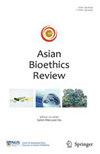非药物干预与社会距离作为主体间关怀和集体保护
IF 1.3
Q3 ETHICS
引用次数: 0
摘要
本文讨论了非药物干预(NPI)作为一种集体保护形式,从健康正义的角度来看,它使处于风险中的群体受益,使他们能够在健康危机期间参与社会生活和活动。更具体地说,该论文断言,实现社交距离的NPI是合理的,因为它们是一种社会保护的组成部分,允许每个人,特别是社会弱势群体,进入公共卫生领域和其他基本社会领域,如家庭和民间社会。本文章由计算机程序翻译,如有差异,请以英文原文为准。
Non-pharmaceutical Interventions and Social Distancing as Intersubjective Care and Collective Protection
The paper discusses non-pharmaceutical interventions (NPIs) as a collective form of protection that, in terms of health justice, benefits groups at risk, allowing them to engage in social life and activities during health crises. More specifically, the paper asserts that NPIs that realize social distancing are justifiable insofar as they are constitutive of a type of social protection that allows everyone, especially social disadvantaged agents, to access the public health sphere and other fundamental social spheres, such as the family and civil society.
求助全文
通过发布文献求助,成功后即可免费获取论文全文。
去求助
来源期刊

Asian Bioethics Review
Multiple-
CiteScore
6.20
自引率
3.40%
发文量
32
期刊介绍:
Asian Bioethics Review (ABR) is an international academic journal, based in Asia, providing a forum to express and exchange original ideas on all aspects of bioethics, especially those relevant to the region. Published quarterly, the journal seeks to promote collaborative research among scholars in Asia or with an interest in Asia, as well as multi-cultural and multi-disciplinary bioethical studies more generally. It will appeal to all working on bioethical issues in biomedicine, healthcare, caregiving and patient support, genetics, law and governance, health systems and policy, science studies and research. ABR provides analyses, perspectives and insights into new approaches in bioethics, recent changes in biomedical law and policy, developments in capacity building and professional training, and voices or essays from a student’s perspective. The journal includes articles, research studies, target articles, case evaluations and commentaries. It also publishes book reviews and correspondence to the editor. ABR welcomes original papers from all countries, particularly those that relate to Asia. ABR is the flagship publication of the Centre for Biomedical Ethics, Yong Loo Lin School of Medicine, National University of Singapore. The Centre for Biomedical Ethics is a collaborating centre on bioethics of the World Health Organization.
 求助内容:
求助内容: 应助结果提醒方式:
应助结果提醒方式:


